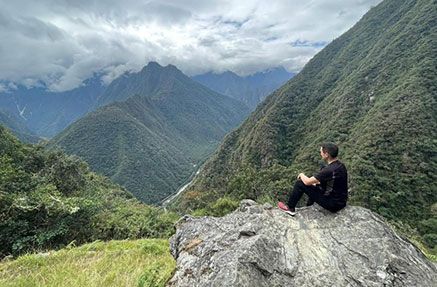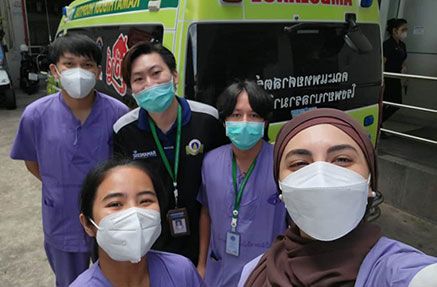For almost 20 years, the Global Health Scholarly Concentration (GHSC) has enabled medical students at the George Washington University (GW) School of Medicine and Health Sciences (SMHS) to explore their interest in global health and broaden their understanding of international health systems, diseases, and assessment techniques.
In collaboration with the Office of Student Professional Enrichment (OSPE), the Office of International Medicine Programs (IMP) facilitates this four-year extracurricular program, guiding students through all required program activities. During their first two years in the GHSC, students attend the Global Health Lecture Series, where they learn from SMHS faculty and other external experts about topics such as global health and climate change, cultural sensitivity and considerations for research, global mental health, global maternal health and child birth, and case studies on various infectious disease burdens. Additionally, as a GHSC requirement, students travel abroad twice to gain enriching global health experiential learning opportunities. After their first year of medical school, students complete an eight-week, non-clinical summer project with one of many IMP-affiliated sites around the world. Subsequently, following their third year, students participate in a four-week international clinical elective rotation.
Students graduate from the GHSC equipped to serve in global communities with a deepened cultural sensitivity and perspective and an understanding of global disease burden and social determinants of health. Continue reading to learn first-hand about the scholarly concentration from some of our current GHSC student leaders: Basil Considine, MSII, Anabel Thurman, MSII, and Diana Vu, MSIII.
Describe a lecture that you found particularly interesting or meaningful.
Anabel Thurman, MSII: Trauma Informed Care for Refugees and Asylum Seekers (Gavin Truong, MD): I found this lecture incredibly meaningful because it is a topic that is very relevant to practicing medicine in Washington, D.C., where there is a large refugee population. Trauma-informed care is a nuanced skill that I believe every medical student should learn. Hearing Dr. Truong discuss the importance of it and how to navigate certain situations was very helpful.

Diana Vu, MSIII: Participating in the GHSC has been a transformative experience for me, both personally and academically. One of the most impactful lectures I attended was “Global Health Sustainability & Colonialism,” presented by Dr. Berndt Schmit. The conversational format of the session allowed for an engaging discussion and diverse perspectives. I found it particularly meaningful as Dr. Schmit emphasized the importance of sustainability and the use of local resources. This insight reshaped my understanding of global health and inspired me to think critically about what a career in global health entails, especially regarding making a lasting impact in other countries.
The eight-week non-clinical summer experience is designed to help students broaden their cultural perspectives, implement inter-cultural sensitivity, and learn about a new health system. In what ways did your summer experience challenge your ways of thinking?
Basil Considine, MSII: My summer experience challenged me to consider primary care and patient education in a different light. In the United States, we often talk about how hard it can be to get a primary care appointment on less than a month’s notice. In Peru, I met patients who were on a waiting list for appointments that was longer than a year! I learned a lot about the importance of patient education, and got a little practice doing so – during my medical Spanish lessons, my teachers frequently asked me to explain medical terms, diets, and how medications worked.
I also was humbled to see how well the Peruvian doctors I met and observed were able to do infectious disease and other diagnoses without relying on polymerase chain reaction tests, used to detect the presence of genetic material such as from a virus, and other lab tests. One of my favorite faculty members at GW, Arnold Schwartz, MD, emphasizes the importance of a detailed patient history. So do the Peruvian doctors whom I met – their examinations were quick, efficient, and very accurate. I never saw a lab result come back that didn’t confirm the top of their differential. It was a great reminder that good health care starts with an attentive provider.

One aspect of my medical Spanish and medical interpreting studies was that I got to follow a whole host of travelers’ journeys through an unfamiliar health care system. We often forget how the specialized vocabulary of medicine can be intimidating and opaque to patients. That’s just as true in Spanish as it can be in English. I learned a lot about how interpreters and multi-lingual doctors can help put patients at ease, and help them get the care that they need.
Diana: During the eight-week non-clinical summer experience, I had the opportunity to explore the health care system of a foreign country. Immersing myself in a different culture and witnessing how health policies are implemented in a diverse environment significantly broadened my perspective. I realized that effective health care relies on a deep understanding of local customs, values, and challenges. This experience prompted me to think critically about health care solutions and reinforced the importance of cultural sensitivity in my future practice.
What are you looking forward to about your international clinical rotation?
Basil: I absolutely want to do an international clinical rotation somewhere in Latin America! I met my goals for language study when I was in Peru, but it was the unexpected things along the way – the people, foods, and taking strangers to the clinic in the middle night – that made it so memorable.
Anabel: I am looking forward to engaging clinically with local communities and potentially exploring a new country if I chose to go to a different site than where I was for my preclinical summer experience.
How do you anticipate that your participation in the GHSC will shape your career goals and future residency?
Basil: As someone planning to go into a primary care field, I expect to have many patients who speak Spanish. I hope that my experiences through the GHSC will make me a more patient, kinder, and more understanding physician who can put patients at ease and help them get the high-quality care that everyone deserves. If there happens to be an overseas clinical during residency (one of my professors did one training local physicians in bedside ultrasound), then awesome!

Anabel: The GHSC has already fed into my passion for global health and has emphasized how important it is that we understand implications of global health. I am not sure what specialty I want to go into, but I know that I will want to participate in global health research or practice in one way or another throughout my career.
Diana: Participating in the GHSC has profoundly influenced my career goals. I hope to integrate global health principles into my residency and practice in the future. The program has reinforced my commitment to addressing health disparities and advocating for underserved populations. I believe that the knowledge and experiences I have gained through this program will guide my decisions as I pursue a career in medicine. Overall, the program has not only enriched my education but has also inspired me to become a more culturally competent and socially conscious healthcare professional.
IMP is proud to provide opportunities for GW SMHS medical students to cultivate their passions for global health and health equity. GW medical students can apply to the GHSC during the fall of their MS1 year.
For more information on the GHSC and other IMP programs, contact us at impinfo [at] gwu [dot] edu (impinfo[at]gwu[dot]edu) or visit our programs and services page.